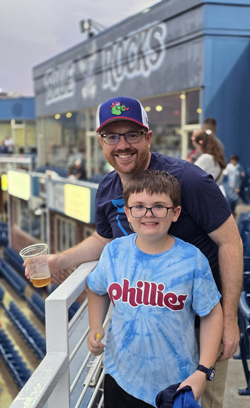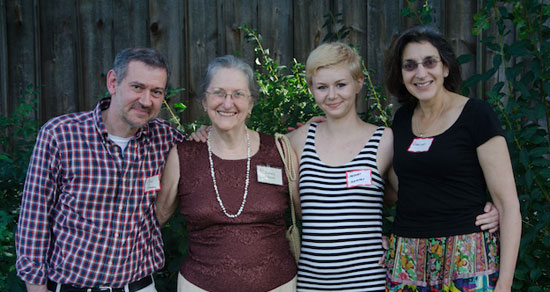Member Spotlight: Phil Holcombe
 I was born in England, where I was diagnosed with Hemophilia A just before my third birthday. Between the years of driving the hours-long trip to our 'local' hospital for infusions and, later, learning to self-infuse, I had the chance to participate in a handful of events put on by England’s Haemophilia Society (English spelling of Hemophilia!).
I was born in England, where I was diagnosed with Hemophilia A just before my third birthday. Between the years of driving the hours-long trip to our 'local' hospital for infusions and, later, learning to self-infuse, I had the chance to participate in a handful of events put on by England’s Haemophilia Society (English spelling of Hemophilia!).
After moving to the US at the age of thirteen, I attended the Double H Ranch as a camper for multiple summers. If you are unfamiliar, the Double H Ranch, located in Lake Luzerne, NY, provides specialized programs and year-round support for children and their families living with chronic and serious illnesses, including Hemophilia. Upon aging out of the camper program, I continued my involvement as a camp counselor & volunteer for several summer and winter sessions. My time at Double H, allowed me not only to mentor youth living with Hemophilia, but gave me the opportunity to help numerous children make special memories and connections during their week long camp experience. I also made special connections of my own, as this is where I met my wife, Emily.
Today, Emily and I live in Delaware with our son (Wyatt), daughter (Paige), and dog (Whitney). When I'm not working as a maintenance manager at a local pharmaceutical company, I enjoy Philadelphia sports, building Lego and traveling.
The Brandywine Valley Hemophilia Foundation is made up of some pretty special people - my family has felt incredibly welcomed by all and have thoroughly enjoyed the fun & educational events we've attended over the years. I look forward to taking my connection with BVHF to the next level, by assisting the foundation's programs and advocacy efforts, and continuing to facilitate special memories & connections for those in our bleeding community.
Member Spotlight: Haldeman-Ramsey family
Who we are.
Three generations of hemophilia with the Haldeman-Ramsey family
Nancy Haldeman Ramsey Olson, her son Chris Ramsey, and his daughter Hadley Ramsey gathered around Nancy’s kitchen table for a discussion of hemophilia and its impact on the family and their lives guided by questions posed by Rosalind Spigel, MSOD and Chris’ partner.
Rosalind: Nancy, did you want to start off and tell us a little bit about how it began to show up in your life and your family’s life.
Nancy: My first son, Jeffrey, was six weeks old when he was diagnosed as a Factor VIII hemophiliac and then his brother, Chris, born one year later was diagnosed at six months, delayed because of difficulty in drawing blood. We later found that there was probably a family history that went back many generations. My mother’s uncle, who died at sixteen, had “bad knees” and lots of other medical problems, but no one ever said the word hemophilia. We assume now that is what it was.
Nancy also has a sister Jane, who is 17 years her junior, who exhibited bleeding problems that went undiagnosed until Nancy’s sons came along. With the evidence of hemophilia in the family Jane was eventually diagnosed with a moderate Factor VIII deficiency as a symptomatic carrier.
Nancy: We grew up together with hemophilia. It was part of our daily life. Since both boys had hemophilia we never knew anything different and never considered it a problem. We transfused around the breakfast table. We were very fortunate. First we had fresh frozen plasma, then cryoprecipitate, and then the more modern treatments. We had them all at home.
Rosalind: I think your sons were fortunate because you were a nurse.
Nancy: Yes, that, and I worked at Children’s Hospital in hematology and made the products myself. So we did have them at home starting in 1967 and that changed life a great deal. And life was further changed when there was a lyophilized, or freeze-dried, product in the late 1960’s. It was bottled and you could take it with you, and it didn’t require constant refrigeration. Also about that time the boys learned to transfuse themselves.
Rosalind: So, Chris, how was this for you? It was a normal life in some ways, but you saw other kids and knew that something was different.
Chris: Yeah. We didn’t participate in normal organized sports activities, but we did play backyard sports with friends and neighbors. My brother and I played basketball with each other and our neighbor. We played occasional touch football with friends, although we didn’t always advertise that to our mother, and we played a lot of backyard volleyball. When we were doing those things with friends in an environment that was more under our control it all worked out pretty well. What we didn’t get to do was play on the school sports teams.
Nancy: But instead you managed the teams or something like that.
Chris: Yes, we found ways to participate.
Rosalind: Were there instance when you found that it was difficult? Were there kids that were worried about you getting hurt?
Chris: There were not a lot of invitations for playdates, not a lot of invitation for birthday parties when we were young. By the time I noticed there were parents that took the leap and allowed the invitations to be made, so I didn’t ever really feel left out. We were a very strong family, so family was friends. We played a lot at my grandparents’ house. We played with my cousins in the back yard there. We went there and swam a lot.
Rosalind: So you had a good support system.
Chris: Yes, and there was always plenty to do, so I never felt deprived.
Nancy: I think of school. I went to the elementary school early and discussed with all the powers that be and each year with Jeff and Chris’ teachers about hemophilia to say that they were not going to cut their finger and bleed to death before their very eyes. They were going to be just like normal kids and that is how they should treat them… with a few moderations. We were very fortunate with the elementary school, and the whole school system was very accepting and understanding of that. I knew of school systems that were not like that and did not want hemophiliacs in their classes at all.
Rosalind: So we have Nancy and her son Chris and Chris’ daughter Hadley.
Hadley: Hello
Rosalind: So how did this first come up for you?
Hadley: When I was nine years old I hurt myself playing in the woods, I ran into a tree and hit my face. My nose didn’t stop bleeding for quite a while. So they figured that I probably had some sort of bleeding problem and should be checked out because of our family history. And that is how I found out.
Rosalind: And how has it affected your life?
Hadley: Not quite as strongly because I am what is called a symptomatic carrier and my hemophilia is only mild. And medical technology has come a long way so it hasn’t been a terrible struggle. The worst parts are arguing with science teachers that, yes, I do indeed have hemophilia and it is possible and I am not a liar. They didn’t like it when I corrected them. I had a teacher once who told us about hemophilia and said if you got a paper cut you would die instantaneously.
Rosalind: Interesting. So among the medical community you still think there is some…
Hadley: Not so much the medical community, but teachers, people who were not so educated about hemophilia specifically. And there have been some medical people whose area is not specifically in hemophilia. I recently had an allergy test and the doctor asked me about five times, “It is all right if I prick you?”, because I did the arm allergy test and I had to keep telling him it was all right and I was not likely to bleed at all.
Chris: It is amazing that there is still so much misinformation. But at the same time there are a lot of people that have a much better understanding. Although there is more information and more people have better understanding there are still a lot of people that operate under the misconceptions that existed years ago.
Hadley: Also with misconception, we had a blood drive at school and they refused to allow my boyfriend to donate blood because I have hemophilia.
Nancy: Do you know why?
Hadley: Because of the whole AIDS scare.
Nancy: As the mother of hemophiliacs and sister of a symptomatic carrier, I was refused at some blood drives during the AIDS scare because surely I must have been exposed myself. That misconception is now corrected in the general medical community.
Chris: There are still a lot of misconceptions about what the treatments are and what it means for all of the people that have never had blood products as their treatment, because many of the treatments now are not really blood product any more, they are manufactured proteins.
Rosalind: Well if there is one parting word or thought that you would want to leave…
Nancy: Living with a chronic disease can be stressful on families in many ways, and our family is no exception, but we have persevered with good results. As you read this, please know the door is always open for you to come with your questions.
Chris: We are a family with a long history of living with hemophilia that goes back to the early days of treatment all the way to modern treatments. We can see the changes that have occurred and the fact that children living with this disease now do not need to be crippled or held back in life in any way as long as they seek the proper treatment from knowledgeable practitioners. They can go on to live essentially normal lives with a disease that is well controlled.

